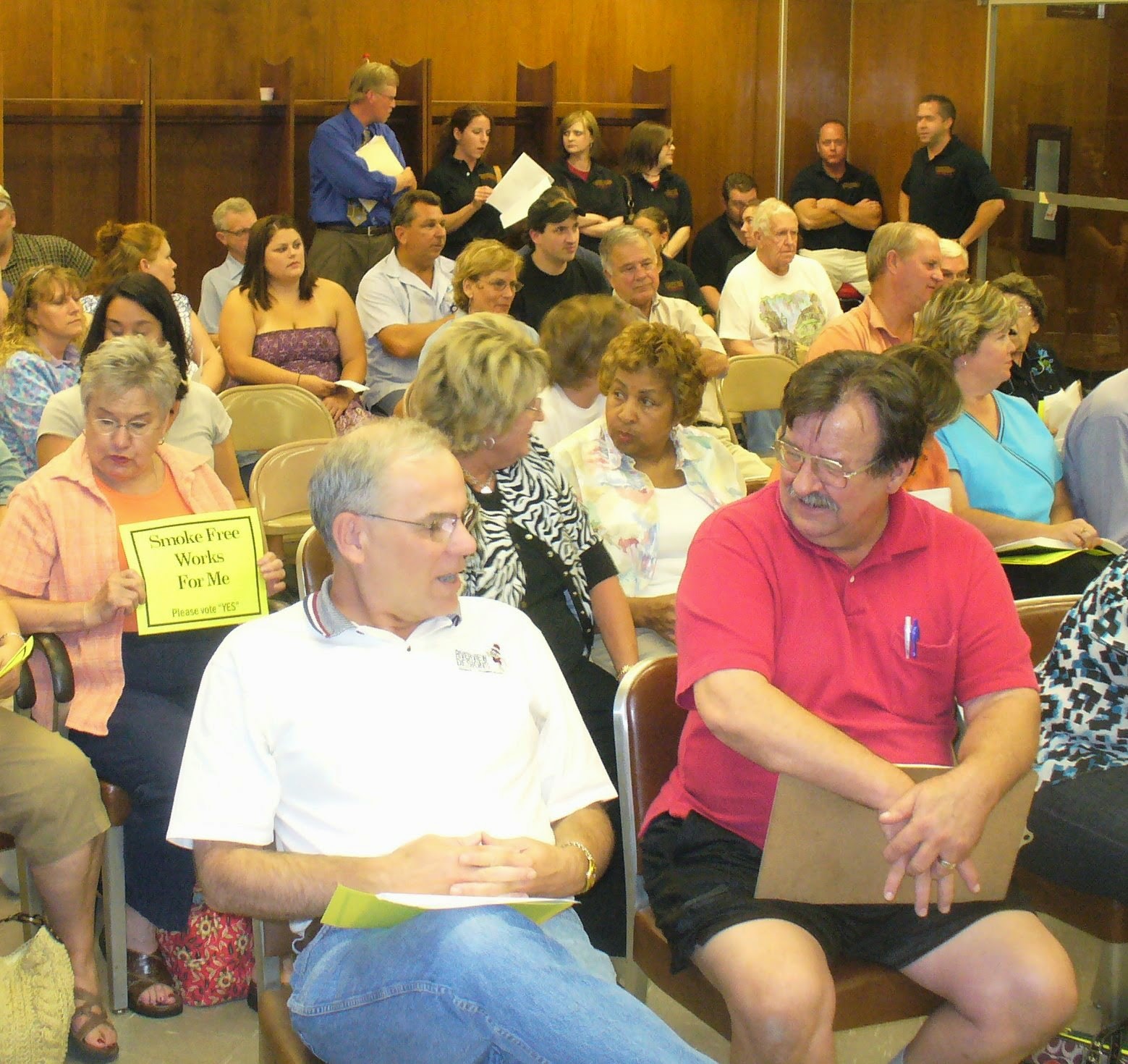
ON THE AVENUES: The long train of usurpations adds a caboose.
A weekly web column by Roger A. Baylor.
(8:30 a.m. update: The News and Tribune’s coverage, with Dr. Tom Harris’ obfuscation)
Watching the Floyd County governing cabal clumsily canoodle has become a spectator sport on a par with cricket racing and celebrity bunco.
Albeit it headless, the doctrine of virtuous fiscal starvation known locally as Heavrinism grimly persists, with any number of countywide elected officials groveling daily at Grover Norquist’s sticky sneakers, as abacus toting auditors come and go, and the county’s down-sized bureaucrats — their waistbands grown narrow and fingernails gnawed to the nib — desperately seek compensatory revenue enhancement wherever they can find it.
No pittance is too small, given that county government hasn’t had a fresh idea since the first land speculator lured Kentucky busing refugees to the non-integrated wide open spaces by felling 136 oak trees to create the affordable sunny expanses of Shady Oak Estates.
Could there be a better time for another botched Camm trial?
—
Never before in the 22-year history of the Floyd County Health Department has it presumed for a single moment to regulate temporary beer dispensation (using draft trailers, cold plates and even the stray bong) by requiring a temporary food permit with accompanying $20 fee each time a solitary growler is uncapped.
For so long as anyone not named Dr. Tom Harris can remember, temporary food permits have been reserved for ad hoc edibles, not alcoholic libations, because Indiana statutory precedent clearly supports the Alcohol & Tobacco Commission’s pre-eminence as primary regulator of adult drinks businesses, both on- and off-premise.
The ATC is our one-stop source for legally relevant permits governing these activities, but suddenly the Health Department is copping an Orwell by insisting that 22 years of rigorous non-contact in fact constitutes a sensual hand job.
Come to think of it, the department just may be on to something, because I am feeling somewhat jerked around.
Last Friday evening (June 14) at the Bicentennial Park Concert Series in revitalizing downtown New Albany, where nowadays pleasure-seeking humans often gather in dangerously subversive groupings without any semblance of church supervision, the Floyd County Health Department dispatched a minion to cite New Albanian Bank Street Brewhouse for dispensing draft beer without a temporary food permit. Two other sub-caterers at this event, River City Winery and Irish Exit, also were cited.
I wouldn’t have been any more surprised to see a burning Bush, sprouting right there in the alley by the bank. And yet by show’s end, there he was.
NABC has appealed the citation. The text of the appeal (below) is being circulated to media folk, to whom I have directed these remarks:
We support the Floyd County Health Department’s daily work to ensure food safety for all of us, and we bear absolutely no malice toward those who have made this decision to ignore precedent and attempt an extension of the department’s control to an area (temporary alcoholic beverage dispensing) for which it lacks coherent statutory authority like that clearly possessed by the ATC.
NABC would be happy to offer educational training to the Floyd County Health Department (to anyone, for that matter) with respect to the fundamental safety of the brewing process, because we know quite well that food-borne pathogens are not present in alcoholic beverages served from pre-packaged containers, i.e, kegs, bottles and cans.
I considered basing the appeal on this sentence alone:
“Any kid at any playground will tell you that changing the rules after the game’s started isn’t cool.”
But the process probably merits a bit more support than the obvious, so here is the full text of my reply.
—
June 19, 2013
The New Albanian Bank Street Brewhouse wishes to notify the Floyd County Health Department of our request for an appeal, as outlined in Chapter 115, subsection 115.41 of the New Albany IN Code of Ordinances, as pertains to a citation issued on June 14, 2013, by Matt Myers, at the location of Bicentennial Park in downtown New Albany, for the offense of having failed to procure a temporary food service permit to pour draft beer.
As operators, we are “aggrieved” by this order, believing it to be misplaced for the following reasons:
1. We can find no coherent precedent, either in the Health Department’s own 22-year history, or in the entirety of the State of Indiana, for abruptly grafting the theory of a temporary food service permit to the benign reality of pouring beer from a keg into a disposable plastic cup by a business already fully licensed by the Alcohol & Tobacco Commission of the State of Indiana (ATC) to do precisely that.
2. We believe that wording in the Health Department’s local enabling ordinances (115.35; Definitions: retail Food Service Establishment) proves our point that primary control of alcoholic beverages rests with the state agency (ATC) and not the Health Department. Reference is made to “drink,” “drink establishment,” “drinking establishment,” and “tavern,” all of which might be taken to imply to all liquids; however, the ordinance’s failure to specify “alcoholic” drinks obviously signals recognition on the part of the legislative branch of local government that such alcoholic drinks historically possess other points of regulatory control: In the case of Indiana, the ATC. Is the local ATC board aware of the health Department’s interpretation?
3. As such, on June 14, as during all previous events like it, NABC possessed the only necessary permit, as issued by our state governing authority (the ATC); specifically, the Type 222 Supplemental Catering Permit, a form of temporary permit, as approved on an event-by-event basis by the ATC district office in Seymour. Whereas the local health department might well be the highest regulatory authority when it comes to Chick fil-A or Bob Evans, those Indiana premises licensed for alcohol serving observe a higher regulatory and statutory authority when it comes to alcoholic beverages: The ATC. Note also that bartenders and servers already possess state-issued server permits, which include server training, and these workers answer directly to guidelines issued by the ATC.
4. Furthermore, we believe that in legal terms, the Health Department cannot impose more pervasive regulatory restrictions on an existing ATC permit bearer, unless the Indiana legislature has specifically allowed it to do so. An example: Recent statewide smoking legislation includes the legal provision that local authorities may impose stricter standards than those mandated within the act itself. Lacking this language, and in the context of the citation we were issued, the requirement for a temporary food permit constitutes an added level of regulatory control not specifically allowed by legislative action.
5. We observe that according to the state’s guidelines for inclusion v.v. a food handler’s permit, beer and wine are specifically given exclusions. It is plainly contradictory to exclude beer and wine from food service training, and then to require a temporary food permit for workers not even required by the state food handling guidelines to receive training in handling beer and wine. How are workers supposed to know the parameters of compliance and non-compliance when these parameters (if any) are not only undefined, but specifically excluded? How can the Health Department charge a temporary permit fee to cover workers handling objects specifically excluded from training? How can a fee be levied for an exclusion?
6. Note that according to the terms of the Type 222 Supplemental Catering Permit, NABC was considered to be the master caterer at the event of June 14, with sub-caterers (River City Winery, Irish Exit) participating at NABC’s behest, and under NABC’s legal authority as charged with enforcing the ATC’s rules. Thus, according to ATC regulations, it is technically incorrect of the Health Department to issue three separate citations. Perhaps your environmentalist did not know this, as he did not ask to view the ATC permit, and probably wouldn’t have known what it was, anyway. Consequently, we ask that you dismiss the citations issued to the other two entities. This event was NABC’s responsibility, and we are happy to take responsibility for it.
7. In summary, we believe that our citation was the result of simple and correctable error; no harm, no foul. Had the Health Department possessed statutory authority to require a temporary food permit of ATC-licensed entities pouring alcoholic beverages, there would be some coherent, applicable precedent within the Health Department’s 22-year history of existence. However, there is none. Had the State of Indiana or local legislative bodies since adopted new statutory guidelines allowing such an expansion, these would be visible somewhere, and/or we would have been forewarned.
They are not, and we weren’t. Consequently, we believe it is the Health Department’s obligation to provide justification for its newfound territorial permitting contention.
We look forward to hearing from you as to when and where the board hearing will occur. Thank you.











